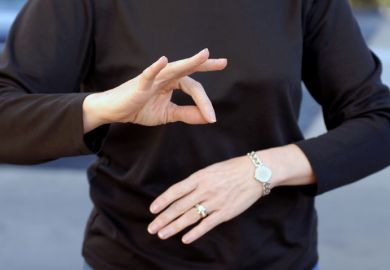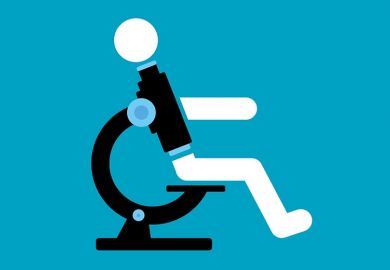It can be difficult to communicate the very latest scientific ideas to those relying on sign language, but a student is working to change that.
British Sign Language (BSL), which is used by about 87,000 people across the UK, already has ways of expressing the biological terms required for study up to roughly the end of secondary school, but not beyond. Because of that gap, the more complex, cutting-edge terms often needed in undergraduate lectures must be spelled out letter by letter.
This raises some obvious problems. If finger-spelling is used for words such as “deoxyribonucleotide” and “deoxyribonucleoside”, it becomes clear only at the very end which is intended. This is not only confusing for students but could even be dangerous in an experimental context.
Liam Mcmulkin, now in the second year of a degree in life sciences at the University of Dundee, has been deaf since birth. Frustrated by the lack of signs for many essential terms, he has embarked on a summer project, funded by a studentship from the British Society for Developmental Biology, to develop 100 new ones.
“Liam’s effort towards creating new signs is crucial to the future of the life sciences,” said his supervisor Marios Stavridis, principal investigator at Dundee’s School of Life Sciences. “During his two years of study, he has already developed signs for biology specialist terms ‘on the fly’, and it will be so rewarding to see these terms used in BSL.
“If you imagine having to finger-spell highly technical terms while sitting in a lecture or having a quick conversation with a colleague, you can appreciate how taxing and difficult it has been for Liam. With these signs, Liam and other deaf students will be able to access science on a whole other level.”
The signs developed by Mr Mcmulkin were set to be presented at biology sign development workshops being held at Dundee on 8 and 10 August, with a view to their being officially incorporated into BSL at a later date.
In a separate development, University College London – the only UK university that requires all undergraduates to possess or acquire basic skills in a foreign language – has now recognised BSL as an option from the academic year 2017-18. The decision was taken in response to calls from UCL’s Deafness, Cognition and Language Research Centre and is designed to raise awareness of and access to BSL.
It is hoped that the move will also prove beneficial to students likely to have dealings with deaf signers in future careers as doctors, speech therapists or teachers. In the US, American Sign Language is already widely accepted as a modern foreign language and is the third most commonly taught in universities.
POSTSCRIPT:
Print headline: Novel science requires novel signs
Register to continue
Why register?
- Registration is free and only takes a moment
- Once registered, you can read 3 articles a month
- Sign up for our newsletter
Subscribe
Or subscribe for unlimited access to:
- Unlimited access to news, views, insights & reviews
- Digital editions
- Digital access to THE’s university and college rankings analysis
Already registered or a current subscriber?




